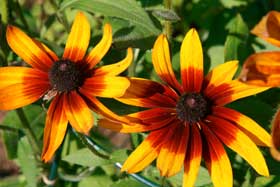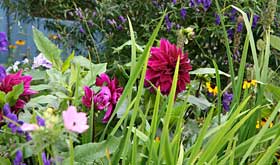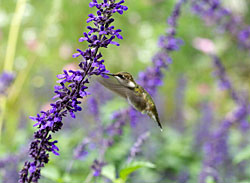SUMMER: The Season of Abundance; the Element
of Fire
- Home
- SUMMER: The Season of Abundance; the Element of Fire
 Summer begins on the longest day of the year, the summer solstice, June 21st. The extra hours of sunlight give us the time to nurture our creative energies and be part of the abundance that surrounds us. In Traditional Chinese Medicine, Fire is the element associated with summer, and it has the power to give light, and to illuminate our inner being as well as our external world.
Summer begins on the longest day of the year, the summer solstice, June 21st. The extra hours of sunlight give us the time to nurture our creative energies and be part of the abundance that surrounds us. In Traditional Chinese Medicine, Fire is the element associated with summer, and it has the power to give light, and to illuminate our inner being as well as our external world.
The warmth of summer gives us the power to fully celebrate life in its bounty. It is the season of growth and maturation, of gardens bursting with flowers and vegetables. The weather is conducive for shared outings and recreational sports, parties and barbecues, walks with friends; we tend to our inner Fire and nurture these relationships
Because the power of Fire is felt most intensely in summer, summer may be the best time for you to concentrate on rebuilding the energy consumed during the winter and spring months. As summer activities can sometimes appropriate your relaxation and meditative time, make sure to find a balance between action and being, between social events and time to be in your garden, or relax in your hammock, and allow the earth to nourish you and recharge your battery pack.
The legendary Yellow Emperor, regarded as the founder of Traditional Chinese Medicine, has these instructive words about the season of summer in the ancient text, The Yellow Emperorʼs Classic of Internal Medicine:*
In the three months of summer there is an abundance of sunshine and rain. The heavenly energy descends, and the earthly energy rises. When these energies merge, there is intercourse between heaven and earth. As a result, plants mature and animals, flowers, and fruit appear abundantly.
One may retire somewhat later at this time of year, while still arising early. One should refrain from anger and stay physically active, to prevent the pores from closing and the chi from stagnating. One should not overindulge in sex, although one can indulge a bit more than in other seasons. Emotionally it is important to be happy and easygoing and not hold on to grudges, so that the energy can flow freely.
These words were written about four thousand years ago, and are as relevant today.
The Fire Element
 In Traditional Chinese Medicine, the Fire element is the spark from which all of life derives. The emotion associated with Fire is joy, which, when in balance, represents an overflowing enthusiasm for life. An excess of Fire, however, can create hyperexcitability and restlessness, while a deficiency of Fire can produce a lack of joy and a feeling of apathy. The color associated with Fire is red; the climate of Fire is hot; and the sound connected with Fire is the sound of laughter.
In Traditional Chinese Medicine, the Fire element is the spark from which all of life derives. The emotion associated with Fire is joy, which, when in balance, represents an overflowing enthusiasm for life. An excess of Fire, however, can create hyperexcitability and restlessness, while a deficiency of Fire can produce a lack of joy and a feeling of apathy. The color associated with Fire is red; the climate of Fire is hot; and the sound connected with Fire is the sound of laughter.
Symptoms associated with imbalances in the Fire element include the following:
- Excessive perspiration, or lack of perspiration
- Rashes, hives, or hot skin eruptions
- Sleep disturbances, insomnia, and restless sleep
- Palpitations, or an irregular heartbeat
- Restless, agitated, or explosive energy
- Inappropriate laughter
- Anxiety and irrational fears and phobias
The Heart
In Western medicine, the small, hollow, muscular organ called the heart is considered to be the center of the circulatory system. Its primary responsibility is to serve as a pump that controls the flow of blood through the body.
In Traditional Chinese Medicine the responsibilities of the Heart are also extended to emotional and spiritual realms. In the ancient Chinese texts, the Heart is compared to a supreme monarch who is responsible for maintaining internal peace and harmony. As Qi Bo explains to Huang Di in The Yellow Emperorʼs Classic of Internal Medicine:* “The heart is the sovereign of all organs and represents the consciousness of one’s being. It is responsible for intelligence, wisdom, and spiritual transformation.”
Each of the elements in Traditional Chinese Medicine has a corresponding yin and yang organ connected with it, but the Heart (the yin organ of Fire) is the supreme monarch, and is attended to by three other organs associated with Fire: the Pericardium, the Small Intestine, and the Triple Heater.
 The Pericardium (called the Heart Protector): In Western medicine the pericardium is the sac that surrounds and protects the heart. In Chinese medicine this strictly structural definition misses the true spirit of the pericardium, which is described in the ancient texts as “The court jester who makes the king [Heart] laugh, bringing forth joy.” Just as the pericardium serves as a membrane that lubricates and protects the heart, it can also be seen as the gate to the heart that allows entry to positive energies, while it bars the entry of negative energies and pathogens into the heartʼs inner sanctum.
The Pericardium (called the Heart Protector): In Western medicine the pericardium is the sac that surrounds and protects the heart. In Chinese medicine this strictly structural definition misses the true spirit of the pericardium, which is described in the ancient texts as “The court jester who makes the king [Heart] laugh, bringing forth joy.” Just as the pericardium serves as a membrane that lubricates and protects the heart, it can also be seen as the gate to the heart that allows entry to positive energies, while it bars the entry of negative energies and pathogens into the heartʼs inner sanctum.
The Small Intestine (the Heartʼs paired Yang organ): In Western medicine the small intestine is an organ supporting digestion, assimilation, and elimination. In Traditional Chinese Medicine the Small Intestine is said “to separate the pure from the impure.” Physically, it separates the pure nutrients from our food and drink, and effectively eliminates the waste. Metaphorically, it is said to separate the “nutritional” parts of our daily interactions with others and eliminate from our consciousness the “indigestible” parts, thus allowing for discrimination in our relationships.
The Triple Heater: Within the Traditional Chinese classification system, the Triple Heater is the only organ that is solely functional and has no structural counterpart. Although the Triple Healer has no physicality, its functions are essential to our health and well-being: the Triple Heater is responsible for heating and cooling the entire system, for thermoregulation.
Below is a table summarizing the basic correspondences associated with the Fire element in Traditional Chinese Medicine.
The Fire Element: Chart of Correspondences
How to Keep Healthy and Joyful During the Summer
As summer is a time for play and relaxation, make sure to create time each day to “de-stress.” Take a few minutes and do what I call “calming the breath.”
- Exhale completely, then close your mouth and inhale through your nose to a count of five. As you breathe in, imagine that pure, clean air is entering your lungs.
- Hold your breath for the count of twenty, imagining that your cells are using this opportunity to empty their waste products into the bloodstream.
- Exhale to ten counts, visualizing the waste products exiting from your body.
 Engage your senses. As summer brings with it a myriad of intense colors, sounds, and fragrances, make yourself available to the abundance all around you.
Engage your senses. As summer brings with it a myriad of intense colors, sounds, and fragrances, make yourself available to the abundance all around you.
- Go outside in the grass barefooted and feel the textures that greet your feet.
- Go into the garden and listen intently to the sounds of the birds and crickets, or of children playing.
- Smell the flowers, the smells of summer, and take time to allow them in.
- Taste the fresh fruits and vegetables, and linger over their unique flavors.
Trust your intuition. The heart rules understanding and intelligence, but not of the cerebral type. When we know something in our heart, we are connected to a deeper part of our being. Try to engage in this deeper knowing, and take the time to listen to your inner voice.
Eat cooling foods, and eat slowly. Enjoy the flavors of the vegetables and fruits in their season. The taste associated with Fire is bitter, so try to include bitter greens like endive, escarole, spinach, kale, and Swiss chard in your diet.
Drink lots of pure, fresh water. The sun pulls the moisture from your pores, so it is important that you rehydrate. Drink eight to ten 8-oz glasses of water a day. If you don’t feel thirsty, force yourself to drink it anyway; most likely, even if you force yourself, your body will give a sigh of relief, thanking you.
Exercise. A healthy heart needs regular exercise to keep the circulatory system in good condition. Get a good cardiovascular exercise and try to build a sweat, which helps to cleanse toxins from the body. Depending on your level of fitness, make your workout fit in. If you are out of shape, begin slowly by walking daily. Try to walk fast enough to just break a bit of a sweat, but don’t overdo it. The heart is more vulnerable in the summer, so build your exercise routine gradually.
*The Yellow Emperor’s Classic of Internal Medicine. Veith I, trans. Berkeley and Los Angeles, CA: University of California Press; 2002.


